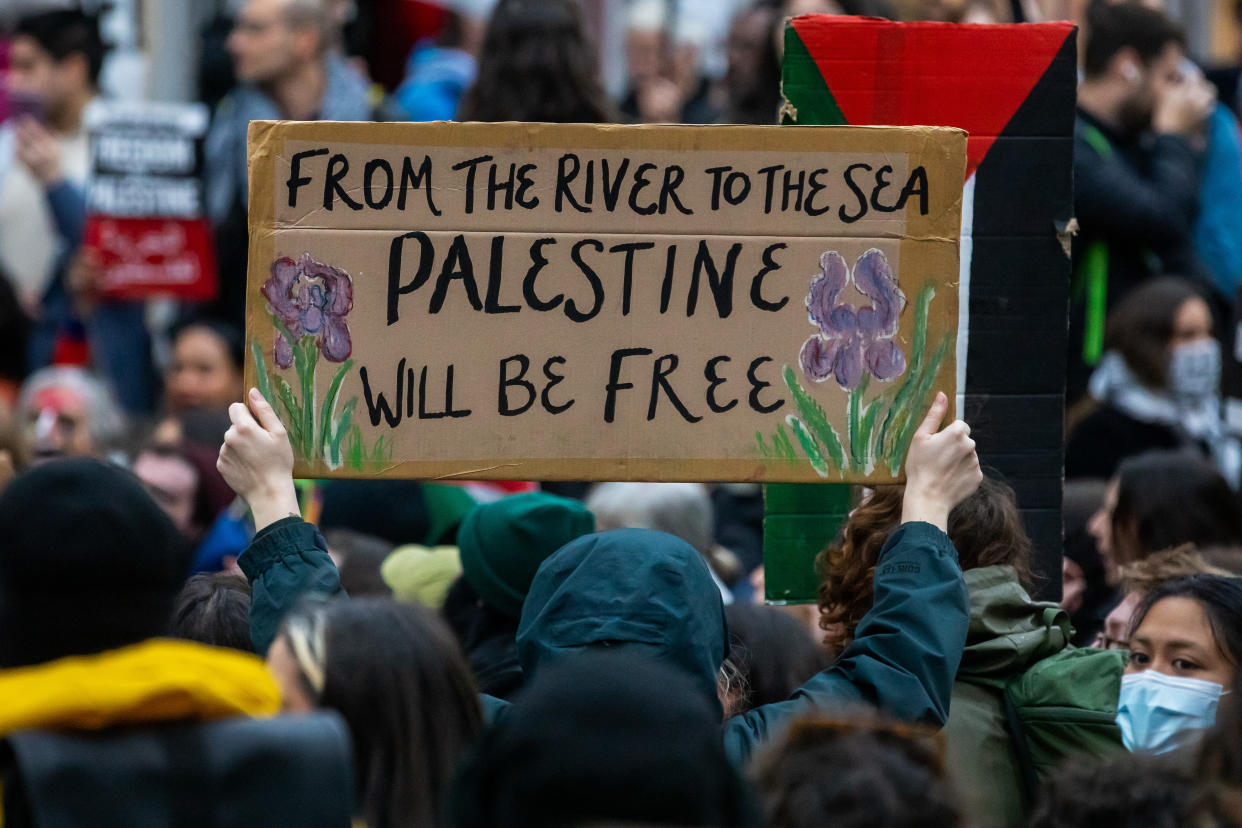Is 'from the river to the sea' antisemitic or just pro-Palestinian?

- Oops!Something went wrong.Please try again later.
Amid fierce fighting in Gaza, some pro-Palestinian activists have given new prominence to an old motto: “From the river to the sea, Palestine shall be free.” Israel’s defenders say the phrase is antisemitic, while critics like Rep. Rashida Tlaib (D-Mich.) say it’s a “call for freedom, human rights, and peaceful coexistence.” Most of Tlaib’s colleagues disagree: This week they censured her, citing her use of the slogan as one reason for the rebuke.
It’s not just Congress. The White House also condemned Tlaib’s phrasing, according to The New York Times. And it’s not just a Washington thing. A conference for the Society of Ethnomusicology was disrupted after the slogan was displayed during a lecture, noted Inside Higher Ed. “It was traumatizing to read a slogan that Hamas has adopted as a rallying cry for the destruction of the Jewish State,” the society said in an apology statement. The controversy is global: Israel’s i24 News reported that Berlin has criminalized the slogan, saying it violates German law and negates Israel’s existence. In the U.K., a member of Parliament was suspended for using the phrase at a rally.
“In this chaotic environment” it’s hard to know which slogans “express legitimate points of view and which convey bigotry,” Eric Levitz wrote for New York. Rather than try to suss out the motivations of speakers, he wrote, it’s better to focus on the plain meaning of the words. “Some speech acts inherently devalue Jewish life. Others don’t.” That doesn’t necessarily bring much clarity to the debates over “from the river to the sea.” It’s one of the “most contentious” debates going.
'The elimination of the Jewish state'
For Israel and its defenders, there’s no ambiguity. The phrase “calls for the establishment of a State of Palestine from the Jordan River to the Mediterranean Sea, erasing the State of Israel and its people,” the American Jewish Committee said in an explainer. While there’s nothing antisemitic about advocating for a Palestinian state, “calling for the elimination of the Jewish state” fits the bill. For Philip Klein at National Review, that makes “from the river to the sea” plainly antisemitic: “The only way you can eliminate Israel and turn that whole area into Palestine is by killing millions of Jews.”
There’s a different way to read it, Ben Burgis argued at Jacobin. The phrase predates Hamas, and it is used by advocates for a “single democratic state with equal rights for Israeli Jews, Palestinian Muslims and Christians … and everyone else who lives there.” That’s a call to extend citizenship to everybody living within the borders controlled by Israel. Tlaib has made it clear that’s how she uses the phrase. Still, Burgis wrote, “you can argue it’s tactically unwise to use a slogan that can be misinterpreted” as having genocidal intent.
There is also a question of the audience. “It’s important to remember this chant is in English and it doesn’t rhyme in Arabic,” Nimer Sultany, a lecturer at London’s School of Oriental and African Studies, told Al Jazeera. The chant, he said, is used mainly in demonstrations in Western countries.
A 'hatred of all Jews'?
“What the phrase means depends on who is telling the story — and which audience is hearing it,” Laurie Kellman wrote at The Associated Press. One thing to note: The slogan has been adopted by Hamas in its violent “drive to claim land spanning Israel.” After the murderous Oct. 7 attacks, it’s difficult for many listeners to take the phrase as anything less than malicious. “No one can now say that in the eyes of Hamas, a hatred of Israel does not mean a hatred of all Jews,” said one London resident.
If the chanter has a well-known “vision of equality and mutual liberation” then it probably won’t seem as threatening, writer and activist Peter Beinart, who is Jewish, told The New York Times. But if “it’s coming from an armed Hamas member, then yes, I would feel threatened.” As long as the war continues — along with the Israeli-Palestinian conflict that sparked it — the two sides might keep talking past each other.

